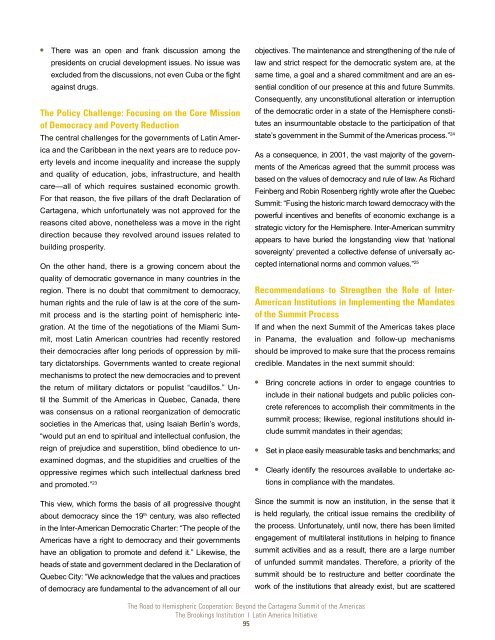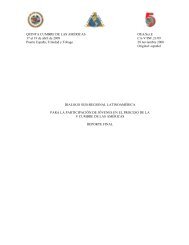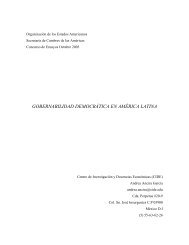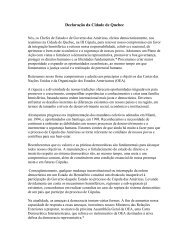The Road to Hemispheric Cooperation: Beyond the Cartagena
The Road to Hemispheric Cooperation: Beyond the Cartagena
The Road to Hemispheric Cooperation: Beyond the Cartagena
You also want an ePaper? Increase the reach of your titles
YUMPU automatically turns print PDFs into web optimized ePapers that Google loves.
●● <strong>The</strong>re was an open and frank discussion among <strong>the</strong><br />
presidents on crucial development issues. No issue was<br />
excluded from <strong>the</strong> discussions, not even Cuba or <strong>the</strong> fight<br />
against drugs.<br />
<strong>The</strong> Policy Challenge: focusing on <strong>the</strong> Core Mission<br />
of Democracy and Poverty Reduction<br />
<strong>The</strong> central challenges for <strong>the</strong> governments of Latin America<br />
and <strong>the</strong> Caribbean in <strong>the</strong> next years are <strong>to</strong> reduce poverty<br />
levels and income inequality and increase <strong>the</strong> supply<br />
and quality of education, jobs, infrastructure, and health<br />
care—all of which requires sustained economic growth.<br />
For that reason, <strong>the</strong> five pillars of <strong>the</strong> draft Declaration of<br />
<strong>Cartagena</strong>, which unfortunately was not approved for <strong>the</strong><br />
reasons cited above, none<strong>the</strong>less was a move in <strong>the</strong> right<br />
direction because <strong>the</strong>y revolved around issues related <strong>to</strong><br />
building prosperity.<br />
On <strong>the</strong> o<strong>the</strong>r hand, <strong>the</strong>re is a growing concern about <strong>the</strong><br />
quality of democratic governance in many countries in <strong>the</strong><br />
region. <strong>The</strong>re is no doubt that commitment <strong>to</strong> democracy,<br />
human rights and <strong>the</strong> rule of law is at <strong>the</strong> core of <strong>the</strong> summit<br />
process and is <strong>the</strong> starting point of hemispheric integration.<br />
At <strong>the</strong> time of <strong>the</strong> negotiations of <strong>the</strong> Miami Summit,<br />
most Latin American countries had recently res<strong>to</strong>red<br />
<strong>the</strong>ir democracies after long periods of oppression by military<br />
dicta<strong>to</strong>rships. Governments wanted <strong>to</strong> create regional<br />
mechanisms <strong>to</strong> protect <strong>the</strong> new democracies and <strong>to</strong> prevent<br />
<strong>the</strong> return of military dicta<strong>to</strong>rs or populist “caudillos.” Until<br />
<strong>the</strong> Summit of <strong>the</strong> Americas in Quebec, Canada, <strong>the</strong>re<br />
was consensus on a rational reorganization of democratic<br />
societies in <strong>the</strong> Americas that, using Isaiah Berlin’s words,<br />
“would put an end <strong>to</strong> spiritual and intellectual confusion, <strong>the</strong><br />
reign of prejudice and superstition, blind obedience <strong>to</strong> unexamined<br />
dogmas, and <strong>the</strong> stupidities and cruelties of <strong>the</strong><br />
oppressive regimes which such intellectual darkness bred<br />
and promoted.” 23<br />
This view, which forms <strong>the</strong> basis of all progressive thought<br />
about democracy since <strong>the</strong> 19th century, was also reflected<br />
in <strong>the</strong> Inter-American Democratic Charter: “<strong>The</strong> people of <strong>the</strong><br />
Americas have a right <strong>to</strong> democracy and <strong>the</strong>ir governments<br />
have an obligation <strong>to</strong> promote and defend it.” Likewise, <strong>the</strong><br />
heads of state and government declared in <strong>the</strong> Declaration of<br />
Quebec City: “We acknowledge that <strong>the</strong> values and practices<br />
of democracy are fundamental <strong>to</strong> <strong>the</strong> advancement of all our<br />
objectives. <strong>The</strong> maintenance and streng<strong>the</strong>ning of <strong>the</strong> rule of<br />
law and strict respect for <strong>the</strong> democratic system are, at <strong>the</strong><br />
same time, a goal and a shared commitment and are an essential<br />
condition of our presence at this and future Summits.<br />
Consequently, any unconstitutional alteration or interruption<br />
of <strong>the</strong> democratic order in a state of <strong>the</strong> Hemisphere constitutes<br />
an insurmountable obstacle <strong>to</strong> <strong>the</strong> participation of that<br />
state’s government in <strong>the</strong> Summit of <strong>the</strong> Americas process.” 24<br />
As a consequence, in 2001, <strong>the</strong> vast majority of <strong>the</strong> governments<br />
of <strong>the</strong> Americas agreed that <strong>the</strong> summit process was<br />
based on <strong>the</strong> values of democracy and rule of law. As Richard<br />
Feinberg and Robin Rosenberg rightly wrote after <strong>the</strong> Quebec<br />
Summit: “Fusing <strong>the</strong> his<strong>to</strong>ric march <strong>to</strong>ward democracy with <strong>the</strong><br />
powerful incentives and benefits of economic exchange is a<br />
strategic vic<strong>to</strong>ry for <strong>the</strong> Hemisphere. Inter-American summitry<br />
appears <strong>to</strong> have buried <strong>the</strong> longstanding view that ‘national<br />
sovereignty’ prevented a collective defense of universally accepted<br />
international norms and common values.” 25<br />
Recommendations <strong>to</strong> Streng<strong>the</strong>n <strong>the</strong> Role of Inter-<br />
American Institutions in Implementing <strong>the</strong> Mandates<br />
of <strong>the</strong> Summit Process<br />
If and when <strong>the</strong> next Summit of <strong>the</strong> Americas takes place<br />
in Panama, <strong>the</strong> evaluation and follow-up mechanisms<br />
should be improved <strong>to</strong> make sure that <strong>the</strong> process remains<br />
credible. Mandates in <strong>the</strong> next summit should:<br />
●● Bring concrete actions in order <strong>to</strong> engage countries <strong>to</strong><br />
include in <strong>the</strong>ir national budgets and public policies concrete<br />
references <strong>to</strong> accomplish <strong>the</strong>ir commitments in <strong>the</strong><br />
summit process; likewise, regional institutions should include<br />
summit mandates in <strong>the</strong>ir agendas;<br />
●● Set in place easily measurable tasks and benchmarks; and<br />
●● Clearly identify <strong>the</strong> resources available <strong>to</strong> undertake actions<br />
in compliance with <strong>the</strong> mandates.<br />
Since <strong>the</strong> summit is now an institution, in <strong>the</strong> sense that it<br />
is held regularly, <strong>the</strong> critical issue remains <strong>the</strong> credibility of<br />
<strong>the</strong> process. Unfortunately, until now, <strong>the</strong>re has been limited<br />
engagement of multilateral institutions in helping <strong>to</strong> finance<br />
summit activities and as a result, <strong>the</strong>re are a large number<br />
of unfunded summit mandates. <strong>The</strong>refore, a priority of <strong>the</strong><br />
summit should be <strong>to</strong> restructure and better coordinate <strong>the</strong><br />
work of <strong>the</strong> institutions that already exist, but are scattered<br />
<strong>The</strong> <strong>Road</strong> <strong>to</strong> <strong>Hemispheric</strong> <strong>Cooperation</strong>: <strong>Beyond</strong> <strong>the</strong> <strong>Cartagena</strong> Summit of <strong>the</strong> Americas<br />
<strong>The</strong> Brookings Institution ❘ Latin America Initiative<br />
95








